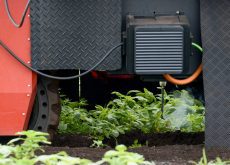ATP Nutrition’s new Synergro G3 has helped the company win the Ag in Motion 2025 Innovation in Agriculture award for agronomy.
The Synergro G3 biostimulant is the first granular biostimulant derived from a consortium of biological metabolites.
Follow all our Ag in Motion coverage here
Read Also

Crop quality looks good this year across Prairies
Crop quality looks real good this year, with the exception of durum.
“It just opens up more opportunity for farmers to be able to use it. More traditionally, with biostimulants, it’s always been in a liquid form,” said Aron Kathler, regional account manager with ATP for western Manitoba and southeastern Saskatchewan.
“Majority of guys are putting fertilizer down in a granular form, so how can we get guys to help out their crops with what majority of the guys are using already?”

The product, which makes it easier for farmers to apply alongside traditional fertilizer applications, was put to market this year in granular form.
Kathler was associate manager for the trials in approximately 100 fields, and while the results varied, saw gains averaging two to four bushels per acre, with the ability to improve rooting mass and above-ground biomass across various crop types, including pulses and cereals on most fields.















